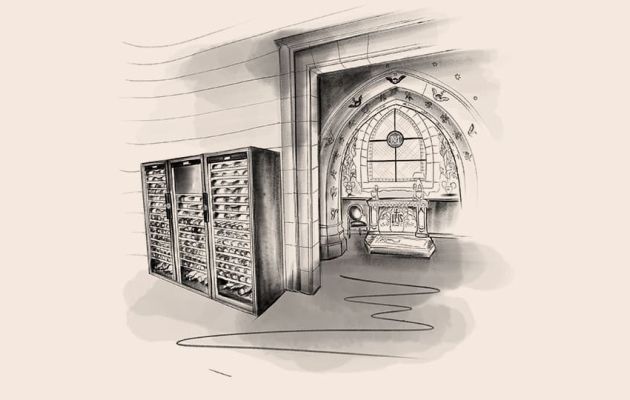
[ WINES ]
A Toast to Learning: 5 Revelations.
with Jimmy Smith, Wine Expert in UK.
For over two decades, Jimmy Smith has been at the forefront of wine education, making wine more approachable and engaging for enthusiasts and professionals alike. As the founder of West London Wine School and a passionate advocate for global wine appreciation, Jimmy has built a reputation for his dynamic teaching style and deep industry knowledge.
In our conversation, he shared five key revelations that have shaped his journey—from debunking common myths to championing emerging wine regions.
01.
Keeping an open mind: the key to enjoying wine
For Jimmy, the most valuable tool in wine appreciation is an open mind. “People often cling to what they know—whether it’s a grape, style, or region,” he explains. Malbec lovers might dismiss Criolla from Argentina or País from Chile simply because they don’t fit expectations. Instead, he urges wine enthusiasts to judge wines on their own merits, not past experiences. Even he pushes his own palate, recently giving Amarone another chance—a style he once avoided—to explore how winemakers are evolving. From low-alcohol wines to unusual varieties, he believes the best discoveries happen outside your comfort zone. “Wine, like life, is best enjoyed with curiosity and an open mind.”
02.
The sulfur myth: separating fact from fiction
One of the biggest misconceptions in wine is that minerality comes directly from the soil. “Many believe flint soil creates a flinty wine,” Jimmy says, “but science doesn’t support this direct correlation.” Instead, he explains how volatile sulfur compounds—formed when wine rests on gross lees (heavy sediment after fermentation)—play a greater role in minerality. “In Burgundy and other classic regions, winemakers let wines rest on gross lees rather than stirring them. These releases sulfur compounds, which enhance the perception of flinty, smoky, or stony characteristics,” he explains. “This technique, called reductive winemaking, plays a much bigger role in minerality than soil itself,” he adds. Even Masters of Wine have been surprised by this revelation. “Tastings prove it: the difference is undeniable.”
03.
The orange wine awakening: a new perspective on tradition
For Jimmy, discovering orange wine changed everything. His first taste of one from Friuli, Italy, in 2010 seemed faulty—oxidative, tannic, and volatile. But deeper research revealed it was an ancient winemaking tradition, used by civilizations like the Romans and Georgians for centuries. This realization reshaped his approach. “Instead of dismissing wines by textbook standards, I started asking, Why was it made this way?” Curious, he researched further and found that civilizations like the Etruscans, Phoenicians, and Greeks had used amphorae and extended skin contact for thousands of years. Winemakers in Georgia, Armenia, and Turkey had preserved these traditions, inspiring a modern revival. Now, Jimmy is a fierce advocate for orange wines, regularly including them in tastings. “At first, people hesitate,” he says. “But when they taste them with food, their eyes light up—just like mine did years ago.”
04.
Embracing diversity: why wine education should be more inclusive
An unexpected comment on one of Jimmy’s online wine education videos changed the way he thought about teaching. While explaining aromatic compounds like black pepper (rotundone) or strawberry-like esters, a viewer pointed out that his flavor references were entirely Western-centric. “It made me realize that not everyone perceives these aromas in the same way,” he explains. “A compound I associate with blackcurrant might remind someone else of a completely different fruit common in their culture.” Now, Jimmy consults with experts to incorporate more culturally diverse sensory references, making his lessons more inclusive. “It takes more research, but it makes wine education truly global,” he says. “And that’s exactly how it should be.”
05.
The future of wine: why the UK and Ontario are regions to watch
Once dismissed as too cold for quality wine, the UK and Ontario are now producing world-class sparkling and still wines. “Both have evolved from wine frontiers to serious players,” says Jimmy. “Ontario, once known for ice wine, now excels in sparkling and still wines, while the UK’s sparkling wines rival Champagne.” Their rise is fueled by climate change, investment from Champagne houses, and expanding vineyards. The UK now produces over 12 million bottles of sparkling wine annually, while Ontario refines its cool-climate varietals. “The UK’s still wines are the next big thing,” Jimmy adds. “With top talent emerging from institutions like Plumpton College and growing expertise in viticulture, these regions are on the cusp of something big.”
Article - Yolanda Mikkelsen
Yolanda Mikkelsen is a certified Wine & Food Connoisseur, driven by a profound passion for flavors shaped by her mixed ethnic background and global travels. Since 2018 Yolanda has served as a host on international TV shows where she showcases the world's premier wine regions and their local produce. She curates and hosts events alongside esteemed wine producers, chefs, and sommeliers, fostering unforgettable culinary experiences. Yolanda's mission is to elevate awareness and appreciation of wine and culinary knowledge worldwide.
Illustrator - Florian Gallou
Florian is a young illustrator and graphic designer from Nantes, originally from Buenos Aires. He studied graphic arts at the École de Design Nantes Atlantique for three years before launching his career as a freelance graphic designer. His work in visual identity design gradually led him to develop his own graphic style and create illustrations to complement his projects. Today, his work showcases a distinctive artistic style.
Prolong the experience
Discover the profiles of creative and influential personalities explaining their relationship with wine, the secrets of sommeliers or legendary establishments.
When you subscribe to the magazine, your email address is only used to send you our content newsletter. You can unsubscribe at any time by clicking the unsubscribe link included in each newsletter. To find out more about management of your data and your rights, click here .



